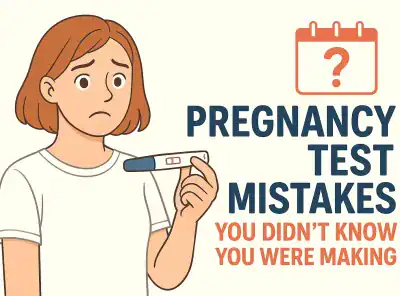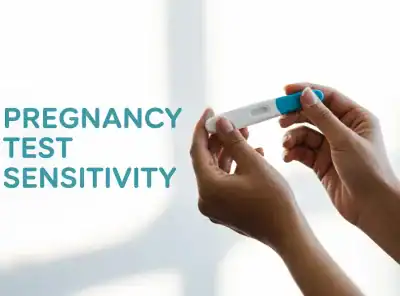Your cart is currently empty!
When Your Body Says “Pregnant” But the Pregnancy Test Says No
It’s one of the most confusing moments: your period’s late, your body feels different, and yet that little test strip is still saying “not pregnant.”
If that’s where you are right now, take a breath. You’re not alone, and you’re not imagining things. False negatives are more common than most people realize and they don’t always stay negative.
Let’s walk through why this happens, when it matters, and what your next steps might be.
- Can You Be Pregnant and Still Get a Negative Test?
- Timing Really Does Matter (More Than Most People Think)
- Why Your Pregnancy Test Might Be "Negative" (Even if You Are Pregnant)
- What If Your Period's Late but the Test Is Still Negative?
- When to Retest (and When to Reach Out for Support)
- Sitting With the Unknown (and What Might Help)
- Real Questions, Real Answers (FAQ)
- While You Wait
Can You Be Pregnant and Still Get a Negative Test?
Yes. Absolutely.
It can happen for a bunch of reasons, and none of them mean you’re doing anything wrong. It might just be too early, or the test you’re using isn’t sensitive enough yet. Some folks also get a negative because their urine is too diluted (especially later in the day), or because of a test that’s expired or handled a little off.
The important thing to know is this: a negative result doesn’t always mean you’re not pregnant. Sometimes it just means your body’s not quite ready to show it on a stick yet.
If you want a deeper look at the science behind this, we walk through all the common factors in our full guide to what can affect your pregnancy test results.
Timing Really Does Matter (More Than Most People Think)
Here’s the thing: pregnancy tests work by picking up on a hormone called hCG. But your body doesn’t start making that hormone right after sex. It starts after implantation, which usually happens about 6 to 10 days after ovulation.
That means if you test too early, especially before 10 days past ovulation, you might just be testing before there’s enough hCG to detect.
And if your cycles aren’t regular? That can make it even trickier to know when ovulation happened in the first place. So if you’re unsure when you ovulated, or your period’s always been a bit of a wild card, it could just be too early. We talk more about pregnancy testing with irregular cycles and how to time things when your cycle doesn’t play by the rules.
Why Your Pregnancy Test Might Be “Negative” (Even if You Are Pregnant)
Even when the timing’s right, a few small details can make a big difference:
- Your urine’s too diluted – this is common if you’ve been drinking a lot of water or test later in the day
- You used an expired test – they do go bad, even unopened
- Instructions were a little off – like not waiting the full time or checking too late
- Certain meds or conditions – some medications (like diuretics) and rare conditions can affect results
Testing can feel straightforward, but in real life, it’s easy to miss a step when you’re stressed or tired. That’s why we put together a guide to the most common pregnancy test mistakes, just in case any of them sound familiar.
What If Your Period’s Late but the Test Is Still Negative?
This is such a hard spot to be in because a missed period is usually the cue to test. So when you do… and the answer is no? It can feel like a wall of uncertainty.
There are a few reasons this can happen:
- Stress or illness can delay ovulation (which then delays your period)
- Your hCG is rising slowly and hasn’t reached detectable levels
- Ovulation happened later than usual – meaning it’s still too early to test
In most cases, it’s okay to wait a few more days and then test again, especially using first morning urine, which tends to be more concentrated.
If you’re wondering when exactly to test, our full pregnancy test timing guide can help you figure out the best moment for your next try.
When to Retest (and When to Reach Out for Support)
If your test was negative today, waiting 48 hours before testing again is usually enough time for hCG levels to rise, especially if you’re in early pregnancy.
But if you’re experiencing any of the following, it’s a good idea to check in with your provider:
- Abdominal pain or unusual cramping
- Bleeding that’s not like your usual period
- Feeling emotionally overwhelmed or unsure what to do next
Even if everything seems physically fine, emotional support still matters. If something doesn’t feel right, speak up, whether that’s with your partner, a friend, or a medical professional. You know your body better than anyone.
Sitting With the Unknown (and What Might Help)
This part, the not-knowing, might be the hardest of all. Especially when you’re trying, hoping, and noticing every tiny change in your body.
It’s okay to feel all of it. To wonder. To cry. To be sure one minute and unsure the next.
If you’re not ready to test again just yet, but still feel like something’s shifting inside, you might find comfort in tuning in to your body’s signals. We explore those more in how to know if you might be pregnant without a test.
And if the test does turn positive down the road? We’re here for that moment, too, with gentle first steps for what to do next.
Real Questions, Real Answers (FAQ)
Can I be 2 weeks pregnant and still get a negative test?
Why is my pregnancy test negative after a missed period?
Is it normal to get a negative test and then a positive later?
Can I be 2 weeks pregnant and still get a negative test?
Yes, and here’s why it’s confusing. Pregnancy is counted from the first day of your last period, not from the day you conceived. So when you’re “2 weeks pregnant,” you probably haven’t even ovulated yet.
That means there’s no hCG for a test to detect yet. Most tests can only pick up pregnancy around 10 to 14 days past ovulation (DPO), usually closer to when your period is due. So if you test too soon, it may come back negative even if you’re on your way to a positive.
Why is my pregnancy test negative after a missed period?
It could be late ovulation, stress, illness, or a slow-rising hCG. If your period doesn’t show up within a week, try testing again or speak with your provider.
Is it normal to get a negative test and then a positive later?
Yes, especially when testing early. Many people get a positive result only after their hCG has had a chance to build.
While You Wait
Still feeling unsure? You’re not alone in that. While you’re waiting for clarity, there are gentle ways to support your body and mind. Warm baths, quiet journaling, or even sipping a fertility-friendly tea can bring a bit of peace while your next steps unfold.
Whatever this moment holds – hope, frustration, stillness, or a mix of it all -you’re doing beautifully. You don’t have to know the ending right now. You just have to keep listening to what your heart and body are telling you.
And we’ll be right here when you need us.






